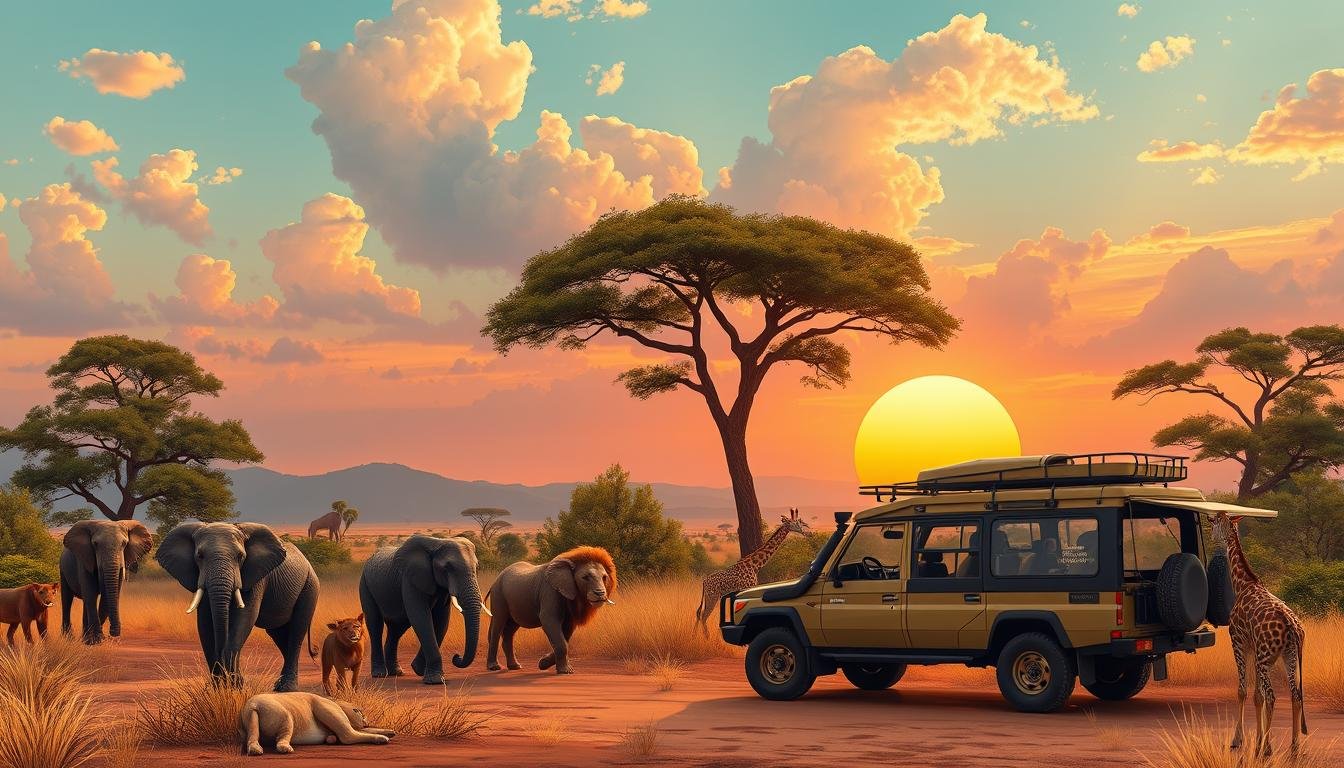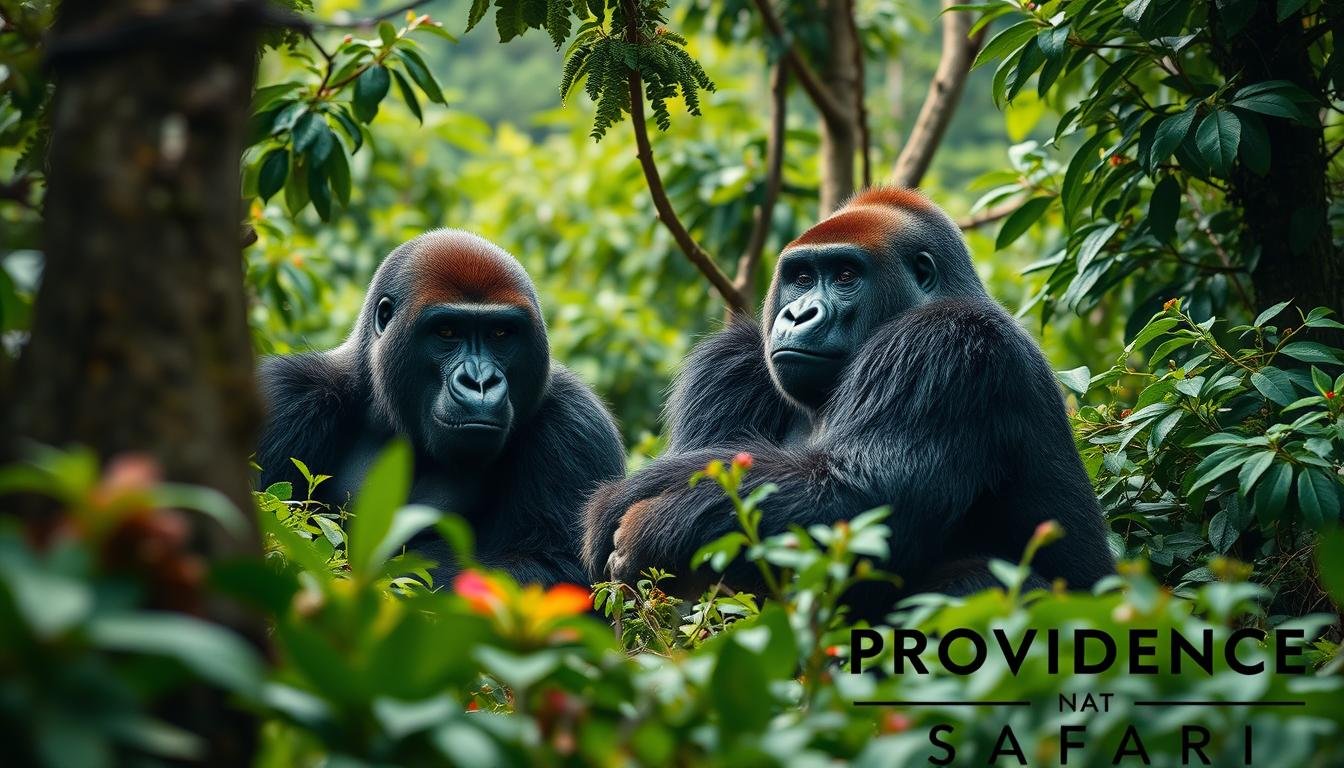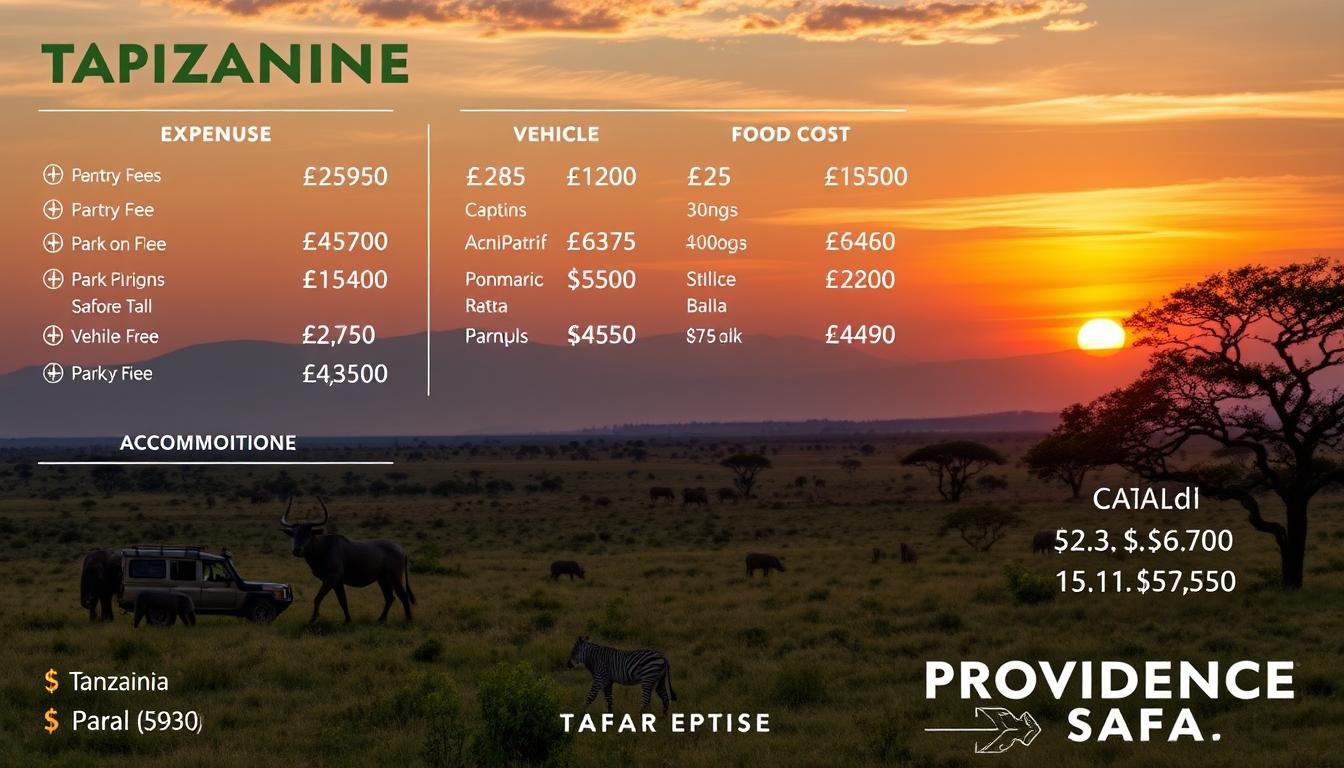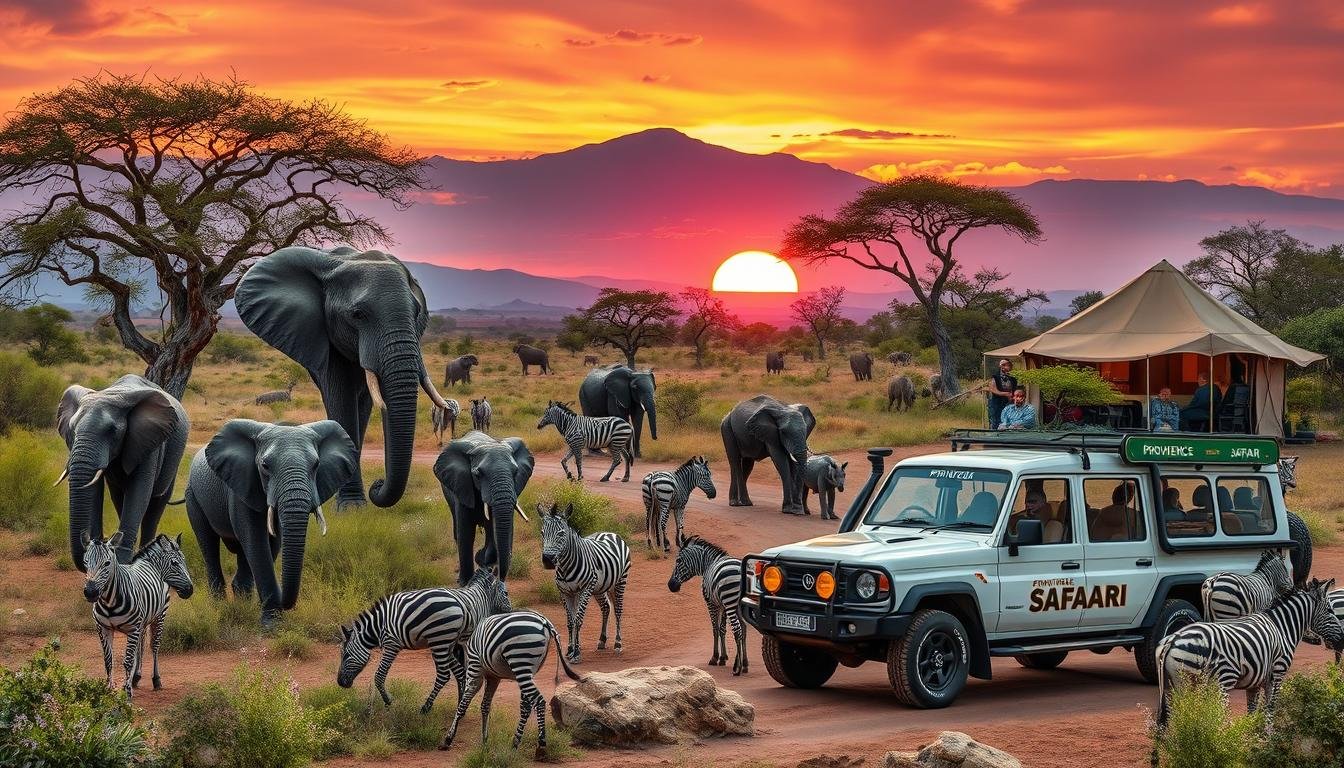Safari trip costs can vary a lot. This depends on where you go, where you stay, and how you travel. Knowing the different safaris and their prices is key for planning your budget.
Average cost per person in Tanzania is $2,500 to $4,000. In Kenya, the average cost is $3,000 to $5,000 per person.
The location of your accommodations can make a significant difference in the overall cost of your South African safari. Getting to your safari spot might involve flying and driving. Domestic flights in Namibia are also pricey but convenient.
The type of car you rent affects your safari costs. You can choose from small cars to big 4x4s. Small cars are cheaper, but bigger SUVs or safari vehicles cost more.
The best time to see gorillas in Uganda is from June to September. From October to May, it’s cheaper to go on a gorilla safari. Choosing the right time for your gorilla safri can save you a lot of money.
Group safaris or traveling with friends and family can lead to savings. Sharing costs with friends means a cheaper budget safari vacation without losing quality. Take advantage of group discounts on park fees and other expenses.
With some planning and flexibility, you can have an African safari without spending too much. Group bookings and sharing costs make your budget safari vacation dream come true.
Knowing about currency and payment options helps manage your safari costs. Booking early can get you better rates. Traveling during the off-peak season can also save you money.
Hidden costs can add up quickly when planning a South African safari. Many travelers don’t realize the expenses involved. This can lead to unexpected financial surprises during their trip.
Knowing the latest trends can help you save money. With good planning, you can have the safari of your dreams. You can make memories that last forever.

19 Nov
Safari trip cost: Going on an African safari is a dream for many. But, the cost is a big part of planning. We’ll look at what makes a safari expensive. Things like where you go, where you stay, and how you get there all matter.
In this guide, we’ll dive into safari costs. We’ll help you understand what to expect for your African trip. Whether you want luxury or something more affordable, we’ll give you the info to choose wisely.
Key Takeaways
- Safari trip costs can vary a lot. This depends on where you go, where you stay, and how you travel.
- Knowing the different safaris and their prices is key for planning your budget.
- Seasonal prices and when you go can also change your safari’s cost.
- Remember to add in extra costs like park fees, food, and activities when budgeting.
- Looking into group safaris and discounts can help you save money.
Understanding the Basics of Safari Trip Costs
Planning a safari vacation means knowing about different safaris and their costs. There are many options, from affordable to luxurious. Let’s look at the types of safaris and what makes them pricey.
Types of Safaris and Their Price Ranges
Safaris fall into two main categories: luxury and budget. Luxury safaris offer top-notch lodges, gourmet meals, and personal service. They’re perfect for those who want a fancy and comfy trip. Budget safaris, on the other hand, are simpler but still authentic. They use public campsites or cheap lodges, ideal for those watching their wallet.
Factors Influencing Safari Costs
Several things affect how much a safari costs. Here are the main ones:
- Accommodation – Where you stay greatly affects the price. Luxury camps are pricier than basic sites.
- Transportation – The way you get around also matters. Flights, private cars, and charter planes each have their own costs.
- Duration – Longer trips, usually 7 to 14 days, cost more than short ones.
- Destination – Where you go can also raise or lower the price. Some places are more expensive than others.
- Group size – Traveling with others can save money. You split the costs with your group.
Knowing these factors helps you plan a safari that fits your budget and taste. Whether you want luxury or something more affordable, there’s a safari for you.
Different Safari Destinations and Their Costs
Planning a Tanzanian or Kenyan safari can be exciting. The destination you pick greatly affects your travel costs. Each country offers unique safari experiences, with costs varying widely.
Popular Safari Countries and Average Prices
Tanzania and Kenya are top safari spots, drawing millions yearly. A Tanzanian safari costs between $3,000 and $5,000 per person. In Kenya, it’s $2,500 to $4,500, based on the package and luxury level.
Comparing Costs Between National Parks
Costs differ in each country’s national parks. For instance, the Serengeti in Tanzania is pricier than Tarangire. Prices for Serengeti are $4,000 to $6,000, while Tarangire is $2,500 to $4,000 per person.
National ParkAverage Cost per Person (Tanzania)Average Cost per Person (Kenya)
Serengeti
$4,000 – $6,000
–
Tarangire
$2,500 – $4,000
–
Maasai Mara
–
$3,000 – $5,000
Amboseli
–
$2,500 – $4,000
Prices change based on park popularity, accessibility, and lodge availability. Researching well can help you find great deals for your safari.
> “The best safari experiences are often found in the lesser-known national parks, where you can enjoy more exclusive and intimate encounters with wildlife.”
Accommodation Options and Their Price Points
Planning a South African safari means choosing your accommodation wisely. It affects your trip’s cost. You can pick from luxurious lodges to budget-friendly camps. Each offers a unique experience and price.
Luxury Lodges vs. Budget Camps
Luxury safari lodges offer top comfort and amenities. They have big suites, gourmet food, and great service. But, they’re pricey, with rates from $500 to $2,000 per night.
Budget safari camps give a rustic, authentic feel. They have comfy tents, shared facilities, and tasty meals. Prices are lower, from $100 to $300 per night, making them budget-friendly.
The Impact of Location on Accommodation Costs
The location of your stay affects the cost. Lodges and camps in prime wildlife spots charge more. They offer exclusive views and experiences. But, places further away or less popular can be cheaper.
Accommodation TypeNightly Rate (per person)
Luxury Safari Lodge
$500 – $2,000+
Budget Safari Camp
$100 – $300
> “The location of your accommodations can make a significant difference in the overall cost of your South African safari. Choosing the right balance between luxury and budget-friendly options is key to crafting an unforgettable experience within your desired South African safari fees.”
Transportation Costs During Safari
Planning a Namibian safari trip means thinking about transportation costs. This includes flights and ground travel. We’ll look at the different ways to get around and their prices. This will help you plan your budget for your African adventure.
Air Travel vs. Ground Transportation Expenses
Getting to your safari spot might involve flying and driving. Flights to Namibia can cost a lot, depending on where you’re coming from and when. Domestic flights in Namibia are also pricey but convenient.
Driving around, however, can be cheaper. You can rent a car or take a private transfer. This way, you can enjoy the beautiful views of Namibia.
Vehicle Types and Their Rental Prices
The type of car you rent affects your safari costs. You can choose from small cars to big 4x4s. Prices vary based on the vehicle.
Small cars are cheaper, but bigger SUVs or safari vehicles cost more. Think about how many people are traveling, how much luggage you have, and the terrain. This will help you pick the right vehicle for your trip.
Vehicle TypeAverage Daily Rental Rate
Compact Car
$50 – $80
Mid-Size SUV
$80 – $120
4×4 Safari Vehicle
$120 – $180
Knowing about transportation costs helps you plan your safari budget better.
Safaris: Guided vs. Self-Drive
Planning a safari in Botswana means deciding between a guided tour or a self-drive trip. Each choice offers unique experiences and benefits. The decision often depends on what you prefer and your budget.
Benefits of Guided Safaris
- Expert guides share knowledge on local wildlife, ecosystems, and cultures.
- They handle all the details, like transport, places to stay, and food.
- Guided tours get you into exclusive safari camps and lodges.
- Guides know where to find rare animals, thanks to their deep understanding of animal behavior.
Cost Comparisons Between Guided and Self-Drive
Guided safaris cost more than self-drive trips in Botswana. They include a guide, private transport, and often, meals and lodging. Self-drive safaris let you control your spending by choosing your own places to stay and activities.
Self-drive safaris have their own costs, like renting a 4×4, fuel, and unexpected repairs. They also mean missing out on the expert insights and access that guides offer.
Choosing between a guided or self-drive safari in Botswana depends on your budget, travel style, and how much you want to immerse yourself in the African wilderness. Weighing the pros and cons helps make a choice that ensures a memorable safari experience.
Seasonal Pricing: When to Book Your Safari
Planning your Ugandan gorilla safari is all about timing. Prices change a lot throughout the year. Knowing when to go can help you save money.
Peak vs. Off-Peak Seasons
The best time to see gorillas in Uganda is from June to September. This is when it’s dry and wildlife is easy to spot. But, prices are higher because more people want to go.
From October to May, it’s cheaper to go on a gorilla safari. Fewer people travel during the rainy months. This means you can save money on your trip.
How Timing Affects Overall Costs
- Peak season (June-September): Higher demand leads to increased Ugandan gorilla safari pricing, with premium rates for lodges, transportation, and permits.
- Off-peak season (October-May): Reduced demand results in more affordable Ugandan gorilla safari pricing, allowing for potential discounts on accommodations and activities.
- Shoulder seasons (April-May, October-November): These transitional periods can offer a balance between lower costs and favorable wildlife viewing conditions.
Choosing the right time for your gorilla safari can save you a lot of money. Booking during the off-peak or shoulder seasons can help you save. This way, you can enjoy amazing wildlife experiences without breaking the bank.

> “The best time to book your Ugandan gorilla safari is often during the off-peak season, when you can find the most affordable prices and fewer crowds.”
Additional Costs to Consider on Safari
When planning an African safari, remember there are costs beyond the initial price. These can add up quickly. It’s key to include them in your budget to avoid surprises.
Park Fees and Their Variability
One big cost is park entry and conservation fees. These fees change based on where you go and the park type. Some parks charge a flat fee, while others have different rates for adults and kids. There might also be extra fees for activities like walking safaris or night drives.
Extras: Meals, Drinks, and Activities
You’ll also need to budget for meals, drinks, and activities. The cost varies based on the safari’s luxury level. Some places include meals and activities in the price, while others charge extra.
ExpenseEstimated Cost Range
Park Entry Fees
$20 – $100 per person, per day
Meals (outside of all-inclusive packages)
$10 – $50 per person, per meal
Optional Activities (e.g., hot air balloon rides, walking safaris)
$50 – $500 per person
Souvenirs and Gratuities
Varies, depending on individual spending habits
Knowing these extra costs helps plan a budget-friendly African safari experience.
Group Safaris: Cost Savings Options
Exploring Africa’s plains on a safari is unforgettable. But, the cost might stop some from going. Luckily, you can save money by joining group safaris or traveling with friends and family.
How Group Bookings Can Reduce Costs
Booking a safari with others can lead to savings. Tour operators give discounts for groups. This way, they fill more seats and make more money. Sharing costs with friends means a cheaper budget safari vacation without losing quality.
Sharing Expenses with Fellow Travelers
- Divide the cost of accommodation, transportation, and meals among your group.
- Look for opportunities to split the cost of private game drives or other activities.
- Collaborate with your group to plan and book the safari, ensuring everyone’s needs are met.
- Take advantage of group discounts on park fees and other expenses.
Working with others lets you create a budget safari vacation that fits your budget and preferences. This way, you save money and share the adventure with others. It makes the trip more memorable.
With some planning and flexibility, you can have an African safari without spending too much. Group bookings and sharing costs make your budget safari vacation dream come true.
Travel Insurance and Its Importance
Going on a safari trip is an exciting journey. But, it’s important to think about travel insurance. This safety net can protect you, making your trip worry-free.
Types of Travel Insurance for Safari Trips
When you plan your safari trip cost, you’ll find many insurance options. Comprehensive travel insurance covers trip cancellations, medical emergencies, lost luggage, and more. It also includes adventure sports coverage, so you’re safe during safari activities.
Estimated Costs of Insurance Coverage
The price of travel insurance for your safari trip depends on several factors. These include your age, trip length, and coverage level. Generally, insurance costs 4% to 10% of your trip cost. For instance, a $5,000 trip might need insurance costing $200 to $500.
Coverage TypeAverage Cost Range
Comprehensive Travel Insurance
4-10% of total trip cost
Medical Emergency Coverage
$50-$100 per person
Trip Cancellation/Interruption
4-8% of total trip cost
When planning your safari trip cost, remember to include insurance costs. This ensures you’re fully protected on your African adventure.
Currency and Payment Methods for Safaris
Planning a Tanzanian safari means thinking about money matters. You need to know about currency and payment options. Understanding exchange rates and accepted payments can affect your trip’s cost.
Handling Currency Exchange Rates
Tanzania and other African countries use their own currencies. You’ll need to exchange your money for the local one. Exchange rates change, so check them before you go. Use a travel credit card with good rates to save on fees.
Common Payment Options in Africa
- Cash: Many places, like safari operators and lodges, like cash for fees and small expenses. Carry US dollars, Euros, or the local currency.
- Credit and Debit Cards: Visa and Mastercard are accepted at big safari companies and fancy lodges. Tell your card company you’re traveling to avoid problems.
- Mobile Payments: Mobile payment systems like M-Pesa are getting popular. But check if they’re used in your safari area.
Knowing about currency and payment options helps manage your safari costs. It makes your trip financially smooth.

CurrencyExchange Rate (as of May 2023)
Tanzanian Shilling (TZS)
1 USD = 2,300 TZS
Euro (EUR)
1 EUR = 2,500 TZS
British Pound (GBP)
1 GBP = 2,800 TZS
Tips for Budgeting Your Safari Trip
Planning a Kenyan safari is exciting, but budgeting is key. It ensures you enjoy your trip fully. Here are some tips to help you budget for your African safari.
Creating a Realistic Budget
Start by figuring out your total trip costs. Think about where you’ll stay, how you’ll get around, and what you’ll eat. Also, consider any extra activities or excursions. By researching and estimating these costs, you can make a detailed budget.
Finding Discounts and Deals
To save money, look for discounts on your trip. Booking early can get you better rates. Traveling during the off-peak season can also save you money. Look for package deals and group tours for more affordable options.
ExpenseAverage Cost (USD)
Accommodation (per night)
$150 – $500
Transportation (per day)
$50 – $150
Park Fees (per person)
$20 – $80
Meals (per day)
$30 – $100
Activities (per person)
$50 – $200
By planning your budget well and using cost-saving tips, your Kenyan safari can be unforgettable and affordable. With the right preparation, you can explore the Kenyan wilderness without spending too much.
Hidden Costs and How to Avoid Them
Planning a South African safari is exciting, but hidden costs can add up quickly. Many travelers don’t realize the expenses involved. This can lead to unexpected financial surprises during their trip.
Common Misunderstandings About Safari Pricing
Many think the initial package price covers everything. But, there are extra costs for activities, transportation, and even basic needs like water and snacks. Not accounting for these can leave you feeling overwhelmed and over-budget.
Strategies for Staying Within Budget
- Research thoroughly and create a detailed budget that accounts for all potential costs, including park entry fees, accommodation, meals, and activities.
- Consider booking your safari during the off-peak season, when rates are typically lower.
- Opt for a self-drive safari instead of a guided tour, which can significantly reduce transportation expenses.
- Pack snacks and water to avoid impulse purchases during the trip.
- Carefully review your travel insurance policy to ensure it covers any unexpected medical or emergency situations.
Anticipating hidden costs and using smart budgeting can help you enjoy your South African safari without financial stress. With some planning and preparation, you can have a great African adventure while keeping your budget in check.

Conclusion: Planning Your African Safari Budget
Understanding the factors that affect safari costs is key to a successful trip. The type of safari, destination, and where you stay all play a big role. Each choice can change your budget a lot.
Summary of Key Cost Factors
We’ve looked at many things that affect safari prices. These include where you go, whether you have a guide, when you go, and extra costs. By thinking about these and choosing wisely, you can have a great and affordable safari.
Final Thoughts on Getting the Best Value
When planning your safari budget, do your homework, be flexible, and look for deals. Knowing the latest trends can help you save money. With good planning, you can have the safari of your dreams and make memories that last forever.
